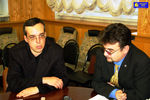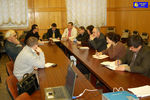On the 22d of January, 2008 the session of the expert seminar "Turkmenistan Today: Politics and Economics" was held in the Russian State University for the Humanities;
On the 22d of January, 2008 the session of the expert seminar "Turkmenistan Today: Politics and Economics" was held in the Russian State University for the Humanities; it was organized by the Department of the post-Soviet foreign countries of the RSUH and Information analysis center (IAC) for the study of social and political processes in the post-Soviet space of Moscow State University (MSU).
Opening the session, the deputy chair of the Department of the post-Soviet foreign countries of the RSUH, Alexey V. Vlasov, told about the work of the seminar this year. He said that the sessions will be monthly and a participation of representatives of the Ministry of Foreign Affairs of the RF is expected in their work.

An expert of Russian News & Information Agency "RIA Novosti", Viktor Panov, presented a report devoted to the modern development of Turkmenistan. He noted that the changes taking place in the closed former Soviet republics are legitimate with the coming of a new president's power. According to the speaker, Gurbanguly Berdymukhammedov has abrogated the most odious decisions of his predecessor, Saparmurat Niyazov, in particular, has engaged in rebuilding hospitals and in-patient clinics, training for various sectors of economy, reanimated the higher education system, increased pensions, the cultural life was activated in his presence in the country.
Director of the Central Asia-Caucasus Institute, Andrey Medvedev, submitted a report dealing with the various orientations of Turkmenistan foreign policy. He reviewed in detail the visits of the heads of states, government members and diplomats of different countries in Turkmenistan, as well as travels abroad by representatives of Turkmenistan. Generally the reporter admitted that the tactic of "gas war" allows Turkmenistan to build good relations with the United States and European states, and noted the marked improvement in relations of this country with its neighbors in the region.

An expert of the Information and analytical center of M.V. Lomonosov Moscow State University (IAC MSU), Alexander Karavaev, told about the impact of energy on the Turkmenistan's politics. He reminded the history of the conflict around the Caspian fields, and pointed out the reasons of increased attention to the Turkmen gas. The reporter denoted the objective problems of field development and pipeline construction - such as a territorial conflict over the field, seismic risk of the district, finally, the question of project profitability.
The rector of the RSUH, Efim I. Pivovar, stressed the importance of research of the questions, discussed at the seminar, noting that Russia has traditionally had a keen interest in the region and recently has tried especially great efforts for the development of multilevel integration with the post-Soviet foreign countries for activation of collaboration in politics, economics, science and culture.
Higher senior officer at the Institute of History of the Uzbekistan Academy of Sciences, Ravshan Nazarov, devoted his report to ethnic politics of Turkmenistan. In his opinion, the formation of the Turkmen nation and the growth of the national consciousness are achieved at the expense of the deprecation, the infringement of non-titular nationalities' rights. The reporter denoted the difficulties involved with the resuscitation of education.
Political analyst, Leonid Gusev, dwelt at length on the relations of Turkmen with Germany. He told about the history of visits, cooperation of both countries in business, the strengthening of contacts between these states. According to the reporter, Germany pursued an active policy in the region, establishing relations with potential suppliers of fuel.
Participants of the seminar discussed the prospects of the Turkmenistan's development, possible directions of its politics, peculiarities of development of the country in comparison with the dynamics of development in other post-Soviet states.